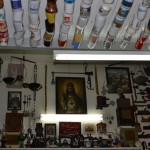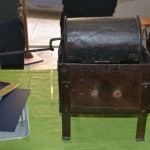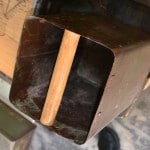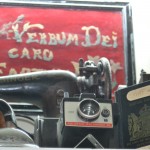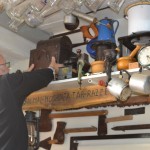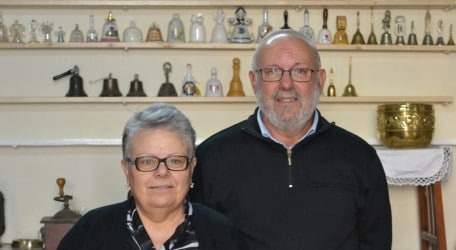
A stroll on the path to the farmhouse
For recently retired Bertu Aquilina and his wife Mary, a large garage at the front of their house just up the road from ta’ l-Ibraġ parish church has become a way of ensuring the heritage of almost a century of history of St Andrews will be conserved.
“People who live here do not know about the past,” Bertu said. “I wish them to know about their roots.”
After spending 16 years helping his uncles and aunt till their fields
in what is today known as tal-Ibraġ, Bertu spent the remaining 40 years of his active working life at Porzjuncola Retreat House in Baħar iċ-Ċagħaq, first as a gardener and latterly in the refectory. Mary was a radio announcer and also taught catechism.
Having retired almost three years ago, Bertu is now dedicated to enhancing his collection of artefacts, some of which have been donated, restoring them and displaying them for the benefit of the many local and foreign visitors who care to stop by. The couple are happy to chat with them, identifying the various items, and explaining their provenance and utility.
Their house is built into the original farmhouse that is at least 90 years old, with some of the walls being about a metre thick.
Bertu is keen to point out that the whole area that today is known as Swieqi, including ta’ l-Ibraġ, parts of Pembroke and High Ridge was originally known as St Andrews, but this place name is slowly disappearing and even the postal authorities now fail to recognise the locality name, preferring Swieqi.
The oldest item in the collection is a coffee bean roaster dating back to before World War II that used to belong to his great-aunts and uncles. Bertu has a childhood memory of having had to work this inkaljatur as a punishment for some mischief he committed. He seems to have had this punishment often because he ended up being given a little chair to sit on instead of having to bend over rotating the roaster’s arm.
One display built into the thick walls has a lot of military memorabilia, with a couple of items having been given to the family by German prisoners of war at Pembroke Barracks in exchange for vegetables and fruit. A rectangular wartime biscuit box had one end hollowed out and a wooden handle inserted. Two of these were lifted on a yoke and used for irrigation.
Not far from his house Bertu says that his great-uncles dug a borehole in the 1920s. This is still in use and the tools used to manually excavate the borehole, located between Triq il-Kartoċċ and Triq in-Nofs – over 100 m (332 feet) deep and some 1.8 m (6 ft) wide, are also on display. He even has the white coal and water light used to enable them to see while digging at that depth.
There are items related to the kitchen, including three Valors, a Flit pump and several weighing scales, items from the bathroom, included branded soaps and a medicine chest, hoists used to lift goods into the farmhouse, and two Primuses on which clothes would be boiled in the yard in large zinc baths.
His family made their own wine with a wine press, fermenting it in wooden barrels and then storing it in large glass demijohns. He even has the funnel they used to strain the wine before it was stored. He has two oil pumps used to dispense cooking oil from the local grocery, five models of Rediffusion sets, including the wall switch A or B for the different channels.
There are three sewing machines, two manual and a foot-operated machine; irons that worked with coal, steam or electric; a Polaroid camera and two passports, pre and post Independence, along with a telephone with a rotary dial. There are some children’s toys, carpentry tools and agricultural implements, apart from a number of paraffin lamps that were used even for everyday lighting since there was no electric light in the farmhouse before 1963.
There are some bird traps, long out of use, a pottery beehive and even the wicker and plastic baskets used to make the local cheeselets known as ġbejniet. There is a comprehensive collection of glass soft drink bottles, milk bottles including the large 2-pint bottle used in hospitals, and some babies’ bottles, wartime biscuit boxes and wooden soft drink crates. There are some measures, different containers and bowls.
Included in the Aquilinas’ display is a collection of over 800 branded glasses, over 200 dolls and doll soldiers, 200 mugs, 150 bells, old photos and a collection of male and female keys. A collection of cribs is also displayed at Christmas.
Bertu is grateful to all those who constantly donate new items for him to add to the collection and is hopeful that schoolchildren in the area will be brought over to learn about the history of the locality. The collection is open most mornings or by appointment.
- February 25, 2014 10 Comments Posted in: Press Launches

